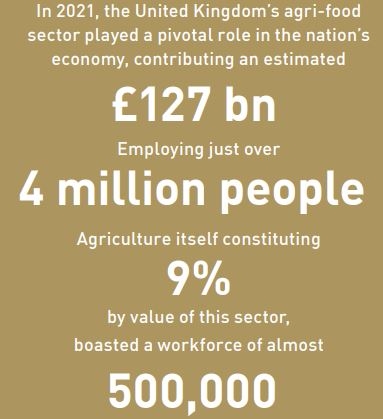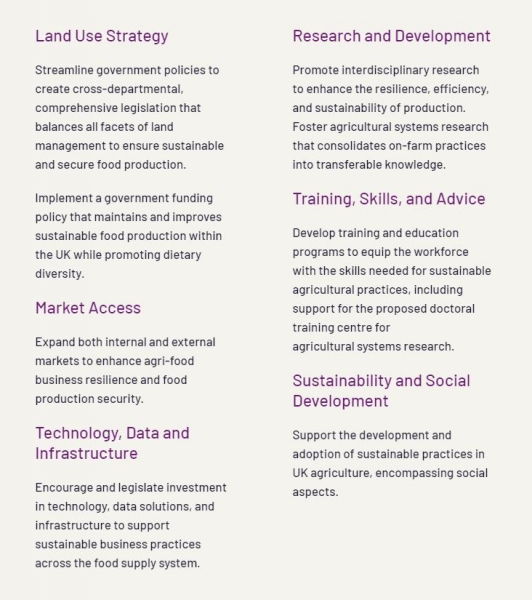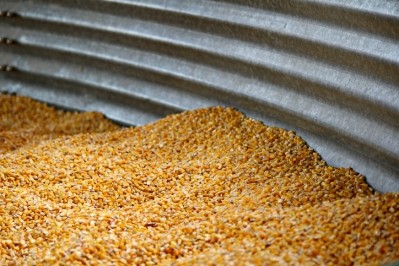AIC: Statutory body needed to shore up UK food security

The review, commissioned by the Agricultural Industries Confederation (AIC) and authored by Dr Marcus Bellet-Travers of Anglia Ruskin University (ARU), was launched at today’s AIC conference in Peterborough; it suggests that a statutory body would provide oversight of the complex nature of agricultural productivity and food security.
It envisages that such a committee, chaired independently, would advise the UK and devolved governments on the drivers of food security and report to parliament on progress made in boosting the productivity and resilience of the UK’s agri-food supply chain – from feed suppliers, farmers and growers, through to processors, manufacturers, food service and retailers.
Much like the independent committee on climate change, such an entity would take a cross-UK view of the legislative direction, aiding policy development and collaboration in support of the UK’s food security, said the lobbyists.
“The UK would benefit from the oversight provided by a statutory body established by government to operate independently beyond short-term parliamentary cycles.”
The AIC, which represents the UK feed and agri-supply industries, is encouraging the entire agri-food sector to back this report’s core recommendations.
Robert Sheasby, chief executive of the industry body, said: “The unprecedented supply chain shocks of recent years have exposed the fragility of the UK’s food supply and its deeply concerning lack of security. Productivity in the agri-food industry is complicated and no one policy or innovation drives its progression. It is the sheer breadth and complexity laid out by this report which has led AIC to call for the establishment of an independent UK food security committee.”
He added: "Developing a clear strategy for food security would provide the certainty that businesses desperately need in order to invest in the UK, facilitating investment in integrated pest management, nitrogen use efficiency, as well as innovation in animal feed and precision breeding.”
A peek inside the report
The backdrop to this report, Powering Productivity for Sustainable UK Food Security, is the UK recently having left the EU, markets recovering from the shocks of a COVID-19 pandemic, a war in Europe, and a cost-of-living crisis.
The publication noted that, in the last decade in the UK, there has continued to be a smaller but steady yield increase in crops, but more noticeable is the greater variability in yield, particularly in wheat and barley, which is affecting security of production in the UK, argues the AIC.
Such yield unpredictability is contributing to the uncertainty in markets with knock on effects in other areas of agriculture such as animal production, where cereals are still a major component of animal feeds.
Impact of higher feed costs
It also observed the significant rises in costs of production for arable farmers and feed producers, with a knock-on effect for livestock farmers.
“In pig production, feed is the single largest cost and so it has a disproportionate effect on profitability. Unlike poultry and cattle production, there has not been a proportionate rise in the value of pig meat putting pig production in a critical state. This situation was further hindered by issues around labour and availability of processing facilities for pig meat that destabilised the supply chain in 2022.
“Labour shortages continue to be an issue post-Brexit and there are no indications that policy or legislation are going to be changed to address these issues. Restrictions in recruitment through legislation stop businesses being agile and recruiting where necessary at short notice. In an environment where an industry such as agriculture is subject to dramatic changes in circumstance, agility is an essential part of viability.”
Risk entire food system becomes stressed...
The risk, remarked the author, is that as one part of the industry becomes under strain it will put strain on the whole food system – from inputs sold to farmers, to the food products sold to processors and ultimately through retail and food service to consumers.
“This can destabilise the industry and cause sudden rises in inflation as was seen in 2022-23 or shortages in production to the extent that shelves are empty of produce, such as eggs, as was also seen in 2022.”
Climate change and political instability in Eastern Europe have already shown the deficiency in resilience of the UK food supply chain, he continued. “These problems go beyond just the logistics of getting food to people’s tables; the connectivity within agricultural production, particularly between crop production and animal feeds, results in magnification of individual issues in production or the supply chain into wider supply problems affecting any number of products. The result is an insecure food supply chain.”














